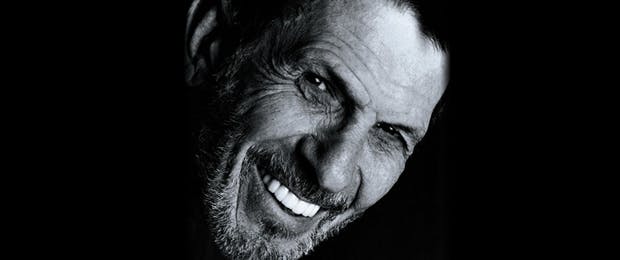Published Feb 27, 2015
My First Interview with Leonard Nimoy
My First Interview with Leonard Nimoy

Ben Robinson is the editorial manager at Eaglemoss in charge of the Star Trek The Official Starships Collection. He is also the co-author of the Haynes Manuals for the Enterprises and the Klingon Bird-of-Prey. Below is an excerpt from "IN MEMORIAM Leonard Nimoy" and read the complete version at HeroCollector.com.
“This,” the voice said down the phone, “is Leonard Nimoy.” “Oh, I know,” I replied, “I’ve been hearing your voice all my life.” He started to laugh, a deep, genuine chuckle. “That makes me feel very old.”
It was 1999 and we were just about to launch a new Star Trek magazine in the States. Leonard was my first major interviewee. I’m always a little nervous when I talk to my heroes because I hope that they will turn out to be nice people and that I will like them. Leonard didn’t disappoint. He was deeply engaged, had an incredible memory for things that happened decades ago, he was intelligent, he was funny and he cared.
That first interview went on for over an hour and over the next four years I talked to him again at regular intervals. He always made himself available when he really didn’t have to. By this time he was a rich man with many interests. And, of course, he had famously written a book called “I Am Not Spock.” When I asked him about that, he laughed again, pointed out that he had written another autobiography called “I Am Spock” and told me that few things made him happier than being greeted wherever he went in the world. “It’s a very lovely thing,” he said.
There’s no question that Spock is one of the most significant fictional characters ever created, someone who ranks alongside Huck Finn, Sherlock Holmes or Batman and Leonard was never just the kind of actor who turned up and delivered his lines.
He was responsible for adding the Vulcan neck pinch, because he didn’t feel Spock should be reduced to punching people. He also added the Vulcan hand symbol, which was based on a Jewish blessing that he had glimpsed as a child when his eyes were supposed to be shut.
When you talked to him, it was clear that he was very invested in Spock and cared passionately about how he was portrayed. “Characters,” he told me, “have to depend on the kindness of actors. I felt particularly that way with Spock because I think Spock could easily become cartoonish or silly. Liberties could be taken. I had to prevent that.”
Legendary Star Trek writer Dorothy Fontana, remembers that Leonard would frequently appear in the writers’ building with suggestions for improvements to the scripts.
Leonard was particularly convinced that Spock should be treated seriously. Years after the fact, you could hear his annoyance at episodes that had trivialized Spock or that had made him seem silly or superhuman. He was profoundly serious about the potential of science fiction and about the creative process but he also believed in the importance of humor. That’s how I remember those interviews – as a combination of really serious creative thought and great humor. He thought deeply about everything but he also laughed at himself.
You also got a sense of Leonard’s generosity. When Star Trek was revived as an animated series in the 70s, it was Leonard who insisted that the entire first season cast return to voice their characters. He gave a million dollars to the Griffith Observatory who named their lecture hall in his honor, offered his services to the SETI program narrating a planetarium and making appearances for free and set up a foundation that supported artists.
When Star Trek returned as a series of movies in 1979, it was perhaps inevitable that Leonard would take on more and more responsibility. He was deeply frustrated by the first movie, which he felt wasn’t about the cast, but was far happier with the second movie, which was very much the kind of Star Trek he believed in. During the filming of that movie, he formed a close bond with producer Harve Bennett and Nick Meyer. With Nick’s blessing, Leonard stepped up to direct the third and fourth Star Trek movies. For Leonard, Star Trek IV was a real high point, and he gave his favorite performance as Spock, “IV became for me the opportunity to put together all the things that I enjoyed about Star Trek and Spock,” he said, “I got to do the Spock I’d always wanted to do.”
Paramount was so pleased with the movies Leonard produced and directed that when they decided to bring Star Trek back to TV in the 80s, they approached him before they even talked to Roddenberry. He declined but was delighted to guest star in the series when they were filming Star Trek VI.
Even later, he returned to co-star in the first JJ Abrams Star Trek movie. He was a great supporter of Zachary Quinto who took over the mantle of playing Spock and typically laughed at the fact that they made him look older in the movie than he did in real life.
Leonard said to me that Spock was “so human, really” and I can think of no more fitting epitaph for Leonard himself. He was passionate, engaged, creative, thoughtful, kind, serious, funny. Harve Bennett wrote a line for Spock’s funeral, “his soul was the most human” and to me there’s no better way of describing Leonard. The world is much poorer without him and he will be missed.

